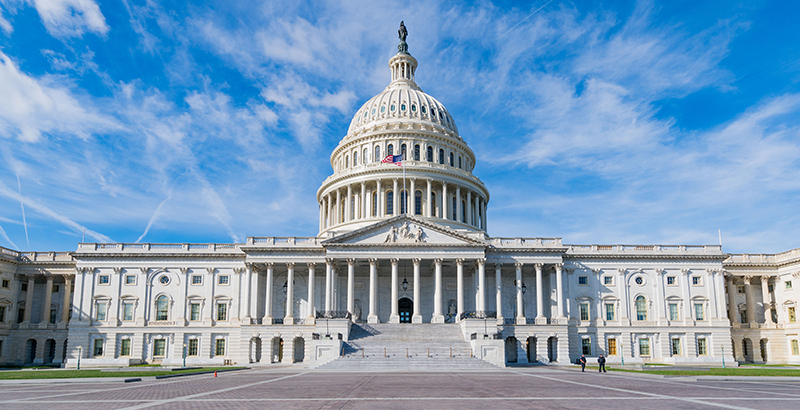Educators Warn of ‘Devastating’ Consequences for Charter Schools in New GOP Tax Bill

When KIPP Academy of Opportunity in Los Angeles opened its doors at the start of this school year, its 400 students were, for the first time in several years, all under one roof.
The school opened in 2003, but Los Angeles’s tight real estate market forced the network to split the students, fifth- through eighth-graders, between two campuses, three miles apart, for the past six or seven years.
That meant higher costs to operate two buildings, stress on kids who had to change buildings frequently, and logistical woes for administrators stretched between two campuses, Marcia Aaron, CEO of KIPP LA, told The 74.
Charter schools in Los Angeles, and around the country, usually must find — and pay for — their own facilities, a tricky prospect given their specific design needs and the high cost of real estate in big cities where many charters are located.
Instead of taxpayer-backed bonds that school districts can float, charters that are ready to construct their own schools rely on a mix of financing tools, often aided by federal tax breaks, to fund construction of their schools.
“The federal government has a unique role to play, mainly in reducing the cost of capital for them to acquire these buildings,” Christy Wolfe, senior policy adviser at the National Alliance for Public Charter Schools, told The 74.
But three of those key programs — tax-exempt private activity bonds for nonprofits, New Markets Tax Credits, and Qualified Zone Academy Bonds — would be eliminated under the tax reform the House passed last week.

“This is devastating to charter schools, which often struggle to find space and lack the amenities of district schools,” National Alliance President and CEO Nina Rees said in a statement Thursday after the House passed its bill.
Without the financial instruments affected by the tax bill, facilities will cost more, meaning schools will have to divert resources from instruction into building costs, she added.
The changes are not included in the pending Senate tax reform bill, which passed the Senate Finance Committee late Thursday on a party-line vote. It’s expected to go to the Senate floor after Thanksgiving, though its future is murky.
One Republican senator has said he opposes the bill in its current form, and several others are thought to have doubts. Senate Republicans can lose just two votes and still pass the measure under special fast-track rules. And after Senate passage, there would be large differences between the House and Senate proposals to reconcile into a final bill.
“While not perfect, the Senate bill is the better bill for public school students, and we are hopeful it will prevail during conference,” Rees said in the statement.
The Trump Administration has called for Congress to pass a bill before the end of the year.
A spokesperson for House Ways and Means Committee chairman Kevin Brady, Republican of Texas, said he is committed to improving the legislation as it moves forward in the legislative process.
“Americans of all walks of life will be better off in the future under a fairer, simpler tax code — one that promotes more investment in our local communities and improve families’ access to education,” the spokesperson said.
“It would probably double or triple our costs”
The ramifications of changing the bonds and tax credits could be huge, said Brian Colon, manager of the charter group at Robert W. Baird, a financial management firm in Denver.
Private activity bonds in particular, which often offer lower interest rates for charters, over a loan term of 30 to 35 years, “have grown up to be a very kind of efficient and cost-effective way for charters to finance their facilities,” he said.
Somewhere between $13 billion and $15 billion in bonds have been issued for charters since 2000, Colon said. His firm has handled $3.2 billion of that, in 130 transactions.
New Markets Tax Credits are given to private investors who then invest in or make loans to community development efforts in low-income neighborhoods, like charter schools. Nearly $2 billion in New Markets Tax Credits helped charters get $3.21 billion in financing for new schools between 2003 and 2016, according to a letter the Alliance sent to House lawmakers.
New Markets Tax Credits have been particularly key in expensive big cities with thriving charter sectors, like Los Angeles, New York, and Washington, D.C., Colon said.
The Qualified Zone Activity Bonds are a smaller benefit to charters. They must be issued through school districts and can be used only for repairs, not new construction.
Some advocates said they suspected House lawmakers didn’t realize they’d be hurting charters by making these changes, and it was simply a last-minute numbers game to find enough funding to offset the larger corporate and individual tax cuts that are included in the bill.
“The House bill maybe didn’t understand the ramifications,” Colon said. Other nonprofit organizations that use the tax-exempt bonds, like hospitals and universities, have many more financing resources than charters, he noted.
If the New Markets Tax Credits and tax-free private activity bonds are eliminated, in short, “We wouldn’t be able to build buildings,” Aaron of KIPP LA said. “It would probably double or triple our costs.”
KIPP LA has used two New Markets Tax Credits and floated $100 million in tax-exempt bonds for 10 schools.
Traditional lenders are wary of lending to charters, and if they do, the costs of those loans would probably be prohibitively high, she said.
That would force KIPP back to the whims of the Los Angeles rental market.
“The problem is there’s very few sites that are big enough to house a full school, and often you can’t get a long-term lease, and the rates go up every year, and then they’re often not designed to your sort of specifications,” she said.
Available buildings, like churches, often are in poor repair, and it isn’t cost-effective for KIPP to sink money into refurbishing a facility if the lease is only for a few years, she added.
Ultimately, the tax rewrite is a huge undertaking, and charters have a lot of competition in getting their concerns addressed as the final bill comes together, Wolfe said.
That said, given that the changes aren’t included in the Senate bill, that it would provide only small savings, and that the optics of limiting access for charter schools aren’t ideal, advocates were cautiously optimistic that the harmful changes would not end up in any final legislation.
Disclosure: The Walton Family Foundation, the Eli and Edythe Broad Foundation, and the Bill & Melinda Gates Foundation provide financial support to The 74, KIPP LA, and the National Alliance for Public Charter Schools. The Carnegie Corporation provides financial support to The 74 and the KIPP Foundation.
Get stories like these delivered straight to your inbox. Sign up for The 74 Newsletter

;)
